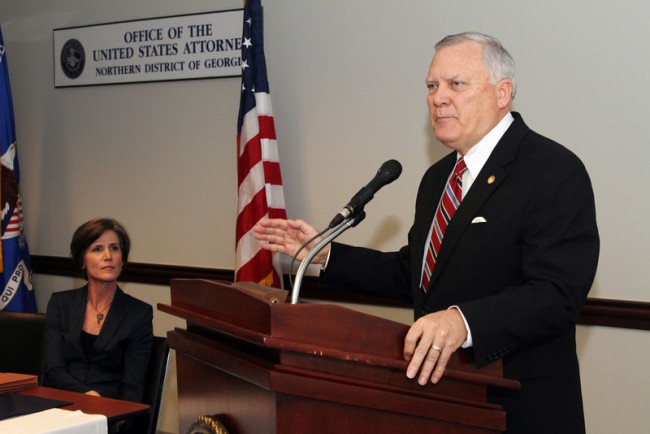by Georgia Center for Opportunity | Apr 14, 2014
Governor Deal signed the criminal justice reform bill, SB 365, into law this past Sunday at Antioch Baptist Church in Gainesville.
This special morning service marked an important milestone for prisoner reentry reform in Georgia and is a testament to the extensive collaboration that has taken place over the last year from the state level down to the community level.

The state has zeroed-in on criminal justice reform for three years now, passing important legislation to improve adult sentencing (2012 and 2013), juvenile justice (2013), and prisoner reentry (2014). The first two reforms were projected to save the state $264 million over a five-year-period, as an increasing number of non-violent offenders are released from prison and placed under community supervision. This move allows expensive prison beds to be reserved for those who pose the greatest threat to society, while providing those with drug addictions and mental health issues the opportunity to receive needed treatment in the community.
Already, the outcome of these reforms has been significant – the state’s prison population has dropped from 57,295 to 53,000 offenders in just two short years, saving the state an estimated $21,000 per inmate per year.
The Governor is hopeful that we will see the same sort of progress made in the realm of prisoner reentry as SB 365 takes effect. This bill makes three important reforms that will assist ex-offenders in obtaining employment:
- It mandates that private background check agencies update their criminal history information on a monthly basis and permanently delete any records that have been restricted or of persons who have been exonerated (absolved from guilt);
- It provides employers a certain level of protection from negligent liability hiring by exercising due care in hiring ex-offenders who have received a Program and Treatment Completion Certificate or a pardon;
- It gives judges discretion in determining whether an offender’s license should be suspended or not for a non-driving-related drug offense.
The success of this reform will be measured with a decreased recidivism rate and increased employment rate among offenders returning to their communities.
Georgia Center for Opportunity is proud to have played a role in influencing the recommendations made by the Georgia Council of Criminal Justice Reform to the state legislature in January 2014, which ultimately made their way into SB 365. GCO has been researching this issue over the past year-and-a-half and believes the state is taking the right approach in working to provide offenders greater access to job opportunities.
Hopefully new bills introduced in subsequent legislative sessions will implement the remaining recommendations made by the Criminal Justice Reform Council on ways to improve the reintegration of offenders in Georgia.
Read more about the signing of this important reform in the Gainesville Times, posted April 14, 2014: http://www.gainesvilletimes.com/section/6/article/98202/ .
by Georgia Center for Opportunity | Mar 8, 2014
Yesterday, Georgia Justice Project (GJP) hosted a lobby day at the Capitol which aimed to “enhance the chance” for Georgians with a criminal record to find employment. Concerned advocates traveled from as far as far as Albany to the State Capitol to voice their support for SB 365, a bill which captures a number of recommendations made by the Governor’s Special Council on Criminal Justice Reform to increase employment opportunities for ex-offenders (read the report here).

Before the 125+ advocates who attended the GJP’s Lobby Day met with legislators, the team at GJP provided a brief run-down of what the bill says, how the legislative process works, and what to say when talking with one’s legislator. Information packets were handed out explaining the nuts and bolts of SB 365, making it as easy as possible for participants to advocate for the recommendations made in the bill.
It a nutshell, SB 365 makes three important reforms that will assist ex-offenders in obtaining employment: (1) It mandates that private background check agencies update their criminal history information on a monthly basis and permanently delete any records that have been restricted or of persons who have been exonerated (absolved from guilt); (2) It protects employers from being accused of negligent hiring if they hire ex-offenders who have received a Program and Treatment Completion Certificate or a pardon; (3) It gives judges discretion in determining whether an offender’s license should be suspended or not for a non-driving-related drug offense.
After the brief orientation, advocates headed to the House Chamber to speak with their representatives. Staff at GJP and other volunteers instructed advocates on how to page their legislator at the ropes outside of the chamber in order to speak with them.
I had the chance to speak with Rep. Tom Rice (R-95) from Norcross about SB 365. Rep. Rice spoke in favor of the bill and mentioned that he has seen virtually no opposition to it in the House. His remarks confirm what we saw in the Senate last Thursday, February 26, as the bill passed unanimously with a vote of 53-0. The bipartisan support for this bill is strong as both parties acknowledge the importance of removing unnecessary obstacles to employment for those who carry a criminal record.
GJP’s Lobby Day at the Capitol finished as Executive Director Jay Neal of the Governor’s Office of Transition, Support, and Reentry addressed the group of advocates who participated in the effort. He expressed his appreciation for people coming out to voice their support for reforms that will improve the lives of those who carry a criminal record. Neal, who is passionate about this issue, shared with the group the effort that the Governor’s Office is putting forth to improve the reentry strategy in communities across the state. He mentioned that Georgia has done in four months what it took Michigan to do in two years – a state that is largely regarded as a national leader in recidivism reduction. Georgia has been to do this because of the broad support these reforms have received from the top-down.
Neal shared with the group that nine years ago the state had 64,000 people in prison or in jail. Today, this population has been reduced to 55,000 people – a savings of nearly $190 million to the state (the average cost of incarcerating a person in Georgia is $21,039 per year). Furthermore, of the 9,000 people released over this time period, 1,000 people were released in just the past month. The majority of these releases are low-level, non-violent offenders who are better-off receiving treatment under community supervision than within prison. These reductions allow the state to reserve expensive prison beds for offenders who pose the greatest threat to public safety.
Much of the success that the state has experienced in reducing prison costs and increasing public safety has taken place through recommendations made by the Criminal Justice Reform Council during the past three years. The council’s recommendations have served as a powerful guide for realigning Georgia’s criminal justice system with evidence-based practices nationwide.
As statewide collaboration continues to take place from the Governor’s office to local community service providers, there is good reason to believe that Georgia will continue to see positive outcomes in offender reentry in the coming years.
by Georgia Center for Opportunity | Mar 3, 2014
For many prisoners reentering society, debts and the inability to save money while in prison create serious obstacles to a successful transition. This debt usually comes in the form of child support arrears, restitution, and various court fines and fees that result from their conviction.
 Photo courtesy of pixabay.com In
Photo courtesy of pixabay.com In
Georgia, offenders are released from prison with only $25, a change of clothes, and a bus ticket. Meanwhile, they may likely carry tens of thousands of dollars in debt as well as the mark of a criminal record, making their prospects of securing a job and housing very difficult.
Because of this fact, offenders usually struggle to provide for their own basic needs upon release, much less service the debt they have incurred as a result of their felony. These offenders transition from a place where all their basic needs were provided by the state, to a situation where their subsistence depends largely upon their ability to get a job. Having been out of the job market for potentially several years, simply affording rent payments, buying food and clothing, and covering transportation expenses can be remarkably difficult. Often additional liabilities, such as child support payments, make circumstances even more difficult, leaving an offender little to no money to spare for the repayment of debts.
Still the demand placed upon offenders to repay their debts and obligations is high, and the penalty for not complying can be stiff. A person under parole supervision in Georgia can be revoked and re-incarcerated for failure to pay child support, restitution, or parole supervision costs.[i] An offender may not be intentionally avoiding paying these costs, but simply not have the means to do so – especially when they have spent the last several years in prison with no means of earning income.
As a result, an inordinate amount of debt can discourage offenders from making current payments (i.e. child support), encourage them to seek illegitimate sources of income, or lead them to abscond.[ii] These responses are harmful for all stakeholders in the community, as unpaid debt and obligations leave children and mothers without financial support, victims lacking financial compensation, and taxpayers burdened with the cost of debt collection, legal fees, and re-incarceration. Moreover, such responses inhibit offenders’ rehabilitation by preventing them from amending past actions and accepting current roles and responsibilities within their families and communities.
It is important for the state to consider how various debts and obligations present unique barriers for offenders reentering society, and to work where feasible to remove those that are unnecessarily punitive. In this way, the state could encourage offenders to meet current obligations and develop a realistic plan for repaying what is owed.
Endnotes
[i] Jake Arbes, “How Parole Works in Georgia,” Jake Arbes Attorney at Law, accessed March 3, 2014, http://www.arbeslaw.com/how-parole-works.html.
[ii] Vicki Teretsky, Staying in Jobs and Out of the Underground: Child Support Policies that Encourage Legitimate Work, CLASP Policy Brief, March 2007.
by Kimberly Sawatka | Mar 1, 2014

Elementary pupils outside classroom talking to teacher. Courtesy: nspt4kids.com
Hidden beneath academic benchmarks, league tables, and other measures of success in education, are the relationships and personal traits that fuel positive and negative outcomes for students. Attending the College Access Challenge Grant Georgia Conference earlier this week, I realized this theme as presenters with extremely challenging backgrounds–such as one man who was abandoned at a bus station when he was 5 years old–shared their stories of trial and triumph. Relationships–both the ones we build with others, and the one we nurture with ourselves–are the true challenge of preparing students to be successful in school and in life.
Prefacing the College Access Challenge Grant Georgia Conference, Georgia Center for Opportunity hosted a meeting focused on the non-academic needs of students earlier this week. Presenters Reginald Beaty and Tony Owens, independent consultants and Co-Deans of Students at Paine College in Augusta, Ga, enlightened the College and Career Pathways working group with trend leading research on non-cognitive variables.
If I just lost you, non-cognitive variables, more commonly referred to as “soft-skills,” are the qualities such as self-awareness, resilience, and even time management that bridge testable knowledge with actual successful outcomes. Notable scholars such as Angela Duckworth, and William Sedlacek, Ph.D have led the conversation on how these skills can be fostered within traditional and nontraditional school settings to transform individual students’ mindsets to ensure they are better prepared to overcome adverse learning challenges.
Paring my experience at the conference with the meeting on non-cognitive variables, I gained 2 important take-aways this week:
-
Personal experiences with adversity can build “soft-skills” such as self-perception and grit (the ability to preserve past challenges to reach long-term goals) that aid academic success. However, the framing of these vital skills in a negative context can potentially render them useless to students.
-
Actively working to connect with students on an individual level, in some cases weeding through the traumas of a student’s life, can change the context through which students utilize these traits to close achievement gaps and reach personal redemption.
Ruby K. Payne, Ph.D notes in her acclaimed book A Framework for Understanding Poverty, that “support systems are simply networks of relationships.” From both meetings, the consensus was that more streamlined support systems are needed to empower students, and there is still much debate around how to deliver a more relationship-focused infrastructure. Seeking a solution for this issue will continue to be at the heart of the College and Career Pathways working group.
by Georgia Center for Opportunity | Feb 7, 2014
Georgia Center for Opportunity (GCO) is pleased to see Governor Nathan Deal and U.S. Attorney Sally Yates (Northern District of Georgia) exercise their influence to encourage business leaders across the state to hire ex-offenders. They are urging employers to give ex-offenders a fair shot in the hiring process and outlining the benefits available to those who choose to hire them.

Governor Deal speaking at a Reentry Summit with U.S. Attorney Sally Yates on Feb. 5, 2014.
Image credit: Georgia.Gov, Office of the Governor.
These actions are consonant with recommendations made by GCO’s Prisoner Reentry Working Group this past December based on input from criminal justice practitioners in Georgia and a review of best practices across the country (See Increasing Employment Opportunities for Ex-Offenders).
One important recommendation made by the working group included increasing the chance that a person with a criminal record will get hired by postponing the question about an applicant’s criminal history to a point after the interview stage of the hiring process. Such an action would give the applicant an opportunity to demonstrate his or her qualifications for a job and provide an explanation for any criminal history to the employer during the interview. It also prevents an employer from automatically screening a candidate who may be the best fit for the position.
Another key recommendation made by the working group is that the state should set the example for other employers by hiring ex-offenders. This action would demonstrate that the state is serious about helping ex-offenders become employed and successfully transition back into society. We believe that the degree of success the state has in finding and maintaining qualified ex-offenders as employees will directly impact the willingness of private employers to adopt similar policies.
Read the following articles posted on February 6, 2014 in the Savannah Morning News to learn more about steps that the key state leaders are making to encourage businesses to hire ex-offenders: http://savannahnow.com/news/2014-02-06/ga-officials-urge-businesses-hire-ex-prisoners#.UvTmvLT-L1V.
by Kimberly Sawatka | Jan 27, 2014
Below is a guest blog by Dr. Eric Wearne of Georgia Gwinnett College and formerly with the Governor’s Office of Student Achievement. Dr. Wearne currently leads GCO’s College & Career Pathways working group.
*********************************
GCO’s college and career readiness working group met at Georgia Gwinnett College in Lawrenceville last week to continue the “college” aspect of its work. The group specifically focused on high remediation rates, communication between high schools and colleges regarding expectations, and issues often faced by first-generation college students. Here is a closer look at some take-aways from this meeting:
- High remediation rates. University System of Georgia (USG) institutions offer three remedial, or “learning support” courses, in reading, English, and math. Whether needing remediation in one area or more than one, Georgia students have historically enrolled in these courses at what seem like high rate. In Fall 2008 (the most recent data reported by USG), USG institutions enrolled 46,500 first-time freshmen. Of those 46,500, 11,603, or 25 percent, were required to take at least one learning support course based on USG requirements. Perhaps the numbers have improved over the past 5 years, but this surely remains a problem.
- High school – college communication. The USG actually has a set of high school curriculum requirements for entering freshmen. But even a student who earns all of the credits on this list could need learning support in multiple areas, based on placement test scores. At a high level, agencies and institutions have been communicating for years about the transition from high school to college, from USG’s high school credit requirements to the career pathways initiative to Complete College Georgia. More communication at a finer-grain level, such as between college faculty and high school teachers in specific content areas, is an area the group spent significant time discussing, and will continue to refine.
- First-generation college students. Finally, the group also explored issues related to first-generation college students. Skills like learning the diligence to wake up, go to campus, attend class, pay attention, and stay the whole time—without anyone telling the student to do so – are skills that many students are not necessarily forced to practice in high school. Many can even graduate without them. Add to this the lack of a family member with experience in building a college schedule, or navigating financial aid, and it becomes much clearer why many first-generation college students struggle on campus. Georgia Gwinnett College provides significantly more individual mentoring for students, as well as much more “intrusive” advising; the college actually attempts to find students who may be struggling, and reach out to them, rather than passively waiting for students who need help to find a campus advising or tutoring center. These efforts have borne results, as GGC has retention rates much higher than comparable institutions; rates that, in fact, sometimes rival the retention rates at Research I institutions.
These areas are part of the framework of the group’s efforts at finding practical solutions to improve the college readiness of Georgia students. Next month, the group will focus on issues specific to “career” readiness, and will work toward preliminary recommendations, and a report on the first stage of its work.





